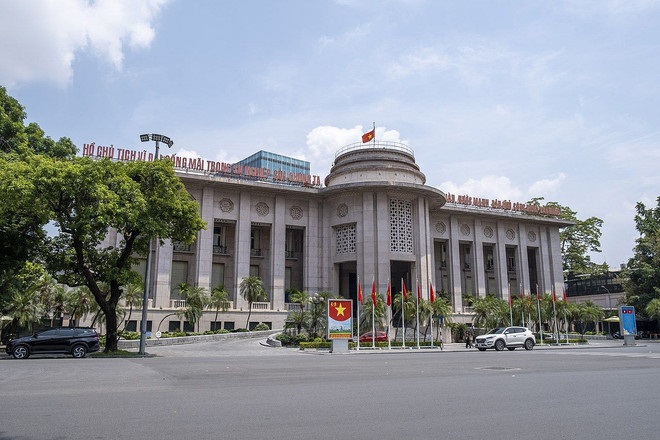
Banks dedicate significant preferential capital to private enterprises. (Photo: Vietnam+)
|
Resolution 68-NQ/TW of the Politburo marked a significant turning point, affirming the role of the private sector as a pivotal driving force in Vietnam’s socio-economic development strategy.
In the context of global and domestic economic challenges, commercial banks have actively deployed preferential credit packages and reduced interest rates to support private enterprises in accessing capital, recovering production and business activities, and boosting economic growth.
What are the banks doing?
Nguyen Thi Hong, Governor of the State Bank of Vietnam, stated that the outstanding credit balance for the private sector currently accounts for 92%-93% of the total outstanding balance, reflecting the strength of this sector and the efforts of the banking industry.
“The banking industry has directed credit institutions to implement the spirit of Resolution 68, accompanying private enterprises to realize the Party and State’s guidelines,” affirmed Governor Hong.
Specifically, the State Bank has instructed credit institutions to deploy preferential credit packages, reduce interest rates, simplify procedures, and apply technology to improve capital access. These programs focus on priority areas such as agriculture, aquaculture, high technology, and real estate.
Governor Nguyen Thi Hong shared that even when global interest rates were on the rise, the banking industry regulated to reduce domestic interest rates, supporting businesses and individuals affected by COVID-19 and natural disasters with a sum of VND 60,000-70,000 billion. Credit packages such as aquaculture loans and home purchases for low-income people utilize resources from credit institutions, independent of the state budget.
At Agribank, the total outstanding balance exceeded VND 1.7 million billion, of which 60% was dedicated to agriculture, rural areas, and farmers, mainly private households. Phung Thi Binh, Deputy General Director of Agribank, shared that 90% of the outstanding balance for legal entities belongs to private enterprises. In 2025, Agribank was assigned a credit limit increase of 13%, equivalent to VND 230,000 billion, mainly targeting the private sector.
Mr. Tu Tien Phat, CEO of ACB, also emphasized the mechanism of supporting a 2% interest rate for small, innovative, and ESG-applying enterprises. However, there are still many barriers. Mr. Phat proposed the need for synchronous solutions, administrative procedure reduction, credit granting process digitalization, and a clearer green credit framework.

In 2025, Agribank was assigned a credit limit increase of 13%, equivalent to VND 230,000 billion, mainly targeting the private sector. (Photo: Vietnam+)
|
Unblocking Obstacles
Resolution 68-NQ/TW served as a timely boost, addressing capital access bottlenecks. However, some enterprises still face challenges.
Mr. Luong Quoc Toan, Deputy General Director of Phu Giang Paper and Packaging Company, shared that despite owning modern machinery and large inventories, banks still prioritize real estate as collateral. Many long-established enterprises that export to multiple countries are denied unsecured loans due to bank risk aversion.
Banks also face challenges. A leader of a commercial bank shared that non-performing loans not only affect profits but also expose credit officers to legal consequences. The situation where enterprises submit two financial statements, one for loan applications and the other for tax submissions, undermines the banks’ trust.
Experts emphasized that transparency is crucial. Enterprises need to demonstrate their capabilities and development prospects with clear data to obtain loans.
Mr. Nguyen Van Than, Chairman of the Vietnam Association of Small and Medium Enterprises, proposed that the government study preferential interest rate policies or credit guarantee policies to support small and medium-sized enterprises in accessing low-cost capital, thereby enhancing their business efficiency.
 Governor Nguyen Thi Hong added that even when global interest rates were on the rise, the banking industry regulated to reduce domestic interest rates to support businesses. (Photo: Vietnam+)
|
Meanwhile, financial and banking expert Can Van Luc proposed establishing a Credit Guarantee Fund at the central level, restarting the 28 local funds, and a Green Transition Support Fund with a 2% preferential interest rate. He also emphasized the role of venture capital funds as the primary capital channel for the development of science and technology and digital transformation, rather than relying solely on traditional bank credit in these fields.
Governor Nguyen Thi Hong emphasized, “The banking industry hopes that the government will direct solutions to make the credit guarantee policy more substantial, develop the financial market, thereby increasing credit for small and medium-sized enterprises, and improve capital turnover.”
The Governor also noted that lengthy investment, production, and business procedures increase interest expenses. Streamlining the apparatus, amending laws such as the Investment Law and the Bidding Law, will help shorten project implementation time, support faster capital turnover, and reduce interest rates.
Resolution 68-NQ/TW has opened up significant opportunities for the private sector through preferential credit packages and interest rate reduction policies. Despite challenges in administrative procedures and capital absorption capacity, the efforts of the State Bank and credit institutions are yielding positive results. With the government’s accompaniment, the banks’ proactive measures, and enterprises’ initiative, the private sector is expected to thrive, contributing to Vietnam’s escape from the middle-income trap and achieving its goal of becoming a developed country by 2045.
Thuy Ha
– 15:38 03/06/2025
Title: Resolution 68: Mastering the Art of Mouth-to-Mouth Resuscitation, Eradicating the ‘Merchant’ Mentality
The Resolution 68 by the Political Bureau on private economic development presents an opportunity for a breakthrough. However, both the state and private enterprises need to introspect and address their internal weaknesses. With a broader vision, the private sector can become a pivotal force in the national economy. There is a belief that private enterprises can become the country’s ‘Saint Giong’, propelling Vietnam to new heights in this new era.
“Unraveling Business Conundrums: A Conversation with Mai Kiều Liên”
“It takes time to untangle the complexities of a business,” says Mai Kieu Lien. “But once those knots are undone, progress will flow like water unblocked and ready to surge forward.”
The New ‘Battles’ and ‘Once-in-a-Lifetime Opportunities’ from the North-South High-Speed Rail Project
“Prime Minister Pham Minh Chinh emphasizes the importance of a clear distinction between the roles of investors and contractors. Investors bring financial muscle to the table, and their expertise lies in recognizing profitable opportunities across various sectors, regardless of their prior experience. Their bold ventures into new territories fuel economic growth and open doors to untapped potential.”
No Criminalization of Economic and Civil Relations: Experts Urge for a Necessary Step
“Deregulating and reducing the number of conditional business sectors is key to curbing over-criminalization. By simply deregulating one conditional business sector, numerous binding regulations and accompanying procedures can be eliminated,” stated the former Vice Chairman of the National Assembly’s Committee.
Prime Minister’s Dialogue with Businesses: Unlocking the Potential of Vietnam’s Private Sector
On May 31st, Hanoi played host to a significant event as Prime Minister Pham Minh Chinh chaired a discussion with businesses and enterprise associations. The focus of this important gathering was to effectively implement Resolution 68-NQ/TW of the Politburo, aiming to boost the development of the private economy.











































